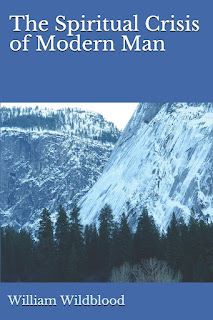A few years ago I wrote a book called The Spiritual Crisis of Modern Man (see here and here) which was largely based on essays from this blog arranged thematically. The crisis has obviously intensified since 2019 when the book was published but its nature has not changed. It concerns humanity's rejection of God which has the effect of leading people to search for meaning in false paths, some political, some supposedly spiritual through the attempted deification of the human self, and some just plain hedonistic. That's to name just a few of the wrong directions in which people may go when they turn away from the path of truth and reality.
The events of 2020 could not have happened, certainly not to the extent they did, in a world in which people acknowledged God. To acknowledge God does not just mean you accept a higher power in which all truth is centred and from which it derives. It means you perceive a meaning and a purpose and goal beyond this world which, let's face it and despite its many beauties, is a distinctly unsatisfying place if it represents the sum total of existence. But surely we should know we are not the body and if we are not the body then this world is not all there is and if that is the case then there must be more, something more real that lies behind it.
We should know we are not the body for many reasons but one simple one is that we speak of 'my' body. That means we recognise that the 'I' lies elsewhere. It is not the product of the body or physically derived but uses the body as part of its experience and means to express itself. Think of your body. It really is just flesh and bone and blood, and surely it should be obvious we are more than that. Obvious as in known unless we are bamboozled by intellectual sophistries. This is not to denigrate the physical body which is currently part of the totality of our being but it is only part and by no means the central part. If people had understood this then they would not have allowed themselves to be panicked by officious bureaucrats and a cravenly compliant media into a quasi-totalitarian situation with an unnecessary and potentially dangerous medical intervention presented as the only escape route. But most people succumbed to the propaganda and they did so because of fear. It was a test which the majority failed. The medical crisis, assuming there ever really was one which is highly doubtful, has passed but the groundwork has been laid for human beings to have their freedom taken away again at some future date. When something has happened once it becomes much easier to do it again. If it's been done before there is precedent so we are less inclined to question it the next time.
Human beings are so constituted that we can accept or deny reality. We have the freedom to do that. But if we make the wrong choice, there are inevitable consequences as in cause and effect consequences. These may not be obvious straightaway but they will become increasingly apparent. Such is our situation. We have turned away from reality and at first there may even have seemed to be the illusion of greater freedom after doing that. There is also a certain freedom if you jump out of a window. However, the law of gravity cannot be ignored and we descend in this certain freedom until we hit the ground. So it is in a spiritual sense. We are falling and the only way to avoid a crash is to learn to fly which basically means return to the acknowledgment of God who alone can save us from a hard landing. I am speaking metaphorically, of course. Suffering in the material sense is not circumvented by faith and spiritual suffering often increases as that is part of the purificatory operation on the soul. But these are transitory and have an ultimately beneficial purpose. The suffering that comes from the rejection of God has no purpose. It is just the negative consequence of denying truth and it does not lead to joy.
Why does one deny truth? Some people might claim that it is an intellectual matter but that is either too simplistic or else an excuse for the failure to exercise proper spiritual responsibility. The true answer lies in the will. The will is sovereign. It is the one thing that is entirely our own and part of the reason for our life in this material world is to test it in an environment where there is no coercion. The current spiritual crisis may in part be seen as the inevitable consequence of a cycle reaching its conclusion when material clouds have thickened to such a degree that the spiritual sun is almost completely obscured. But even when you cannot see the sun its light is perceptible and so it is now. The light of God may be obscured but it is still present and we should know that without that light we could not see anything at all. The current crisis, which is now in the process of moving from simple crisis to actual madness, is to bring things to a head. Use the situation in the world today as a springboard to push against and return to God.

